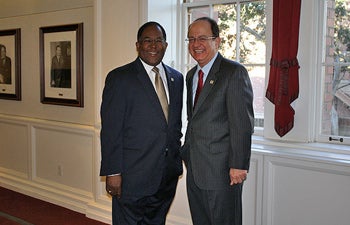Pillar of Empowerment
In 1968, Mark Ridley-Thomas was a seventh grader at George Washington Carver Middle School in southeast Los Angeles. At Victory Baptist Church near his school campus, the Rev. Dr. Martin Luther King Jr. often preached and organized.
When asked if he remembers April 4, 1968, the Los Angeles County supervisor is visibly astonished, rightfully so, that such a question could be pondered.
“Like it was yesterday,” said Ridley-Thomas, 12 at the time. “When the news broke, people were moving. Activity exploded. There was no way not to know what was going on. It was clear by virtue of the fact that the entire nation was enveloped by this historic event, Dr. Martin Luther King’s assassination.”
Los Angeles was still reeling from the Watts uprising of 1965, a five-day tragedy that left 34 dead.
“Things hadn’t fully settled down in this town,” Ridley-Thomas said in his soft spoken, no-nonsense demeanor. “This was the ’60s and all of what that represented.”
Integration and desegregation in L.A. schools were raging. At Carver, the youngster was selected for a summer program that sent him to The Claremont Colleges’ campuses.
“I studied everything from astronomy to zoology, literally,” he said.
Ridley-Thomas spent following summers on other college campuses, taking classes with middle school students of various minority groups.
“This was probably formative in terms of my consciousness,” he said, “in terms of coalition building and seeing the intrinsic value in all people. Later, it was not difficult to connect that with nonviolence and how it had revolutionary implications for how we could live and transform our society.”
The early opportunity put him on an accelerated educational track.
“I don’t recall being a straight-A student, but I did fine in school,” said Ridley-Thomas, the youngest of five children whose father was a construction worker and mother, a seasonal clerk for the Internal Revenue Service. “If nothing else, I was a strong listener and had an aptitude for learning.”
At Manual Arts Senior High School, he participated in an integration program that offered courses in other L.A. schools. Inspired by King, he already knew he wanted to focus on the social sciences.
“It was his voice, now unmistakable, that we heard on radios across the nation, giving his immortal speech, ‘I Have a Dream,’” Ridley-Thomas said inside his satellite Exposition Park Drive office, where a large bust of King near his desk seemed to be listening in. “I became a student of the philosophy of Dr. Martin Luther King Jr. from that point on.”

Los Angeles County Supervisor Mark Ridley-Thomas with USC President C.L. Max Nikias during the 2011 Empowerment Congress Summit hosted by USC in January.
He earned a bachelor’s degree in social relations and a master’s in religious studies from Immaculate Heart College in preparation for teaching. After receiving his Ph.D. in religion with an emphasis in social ethics from USC Dornsife in 1989, he became an adjunct professor at USC, Claremont Graduate University and other universities, teaching in urban studies, public administration, ethics, the philosophy of King and other religious revolutionaries such as Mohandas K. Gandhi, Dorothy Day and Thich Nhat Hanh.
“The social content was there; I was already in that milieu,” he said. “It was the question of how to apply it.”
He taught high school before crossing over to advocacy as executive director of the Southern Christian Leadership Conference of Greater Los Angeles, where for a decade he worked on issues such as school desegregation, police misconduct, domestic violence, violence against women, dispute resolution, and educational programs for parents.
During his involvement in the Theology in the Americas in the ’80s — an international progressive multiracial and religious movement — he met philosopher, author and activist Cornel West. That meeting would launch a 30-year friendship.
Ridley-Thomas never aspired to be an elected official, but felt the calling and has served on the local, state and county levels. From 1991 to 2002, he was a Los Angeles City Council member. From 2002 to 2006, he served on the California State Assembly representing the 48th district, then joined the California State Senate representing the 26th district until 2008. That year he became the first African American man on the L.A. County Board of Supervisors. His 2nd district, with more than 2 million residents, includes the USC area.
In his satellite office near USC hangs a framed photo of Ridley-Thomas, West and talk show host and author Tavis Smiley with an inscription, “Three Pillars of Empowerment.”
As an elected official, one of his greatest achievements has been establishing the Empowerment Congress, which promotes civic engagement among neighborhood groups, residents, nonprofits, businesses, religious groups and community leaders. In its annual Empowerment Congress Summit hosted by USC in 2011, President C. L. Max Nikias spoke to the more than 1,200 attendees. The partnership — which celebrates its 20th anniversary in 2012 — was the precursor to the Neighborhood Council Movement and is a model for local elected officials nationwide.
When asked whether he would consider serving in Washington, D.C., he paused before answering: “I have no prediction or projection as to where my journey is going to take me, said Ridley-Thomas, who has two adult sons with wife Avis. “I just always think it is appropriate to be prepared.”
Read more articles from USC Dornsife Magazine’s Spring/Summer 2011 issue